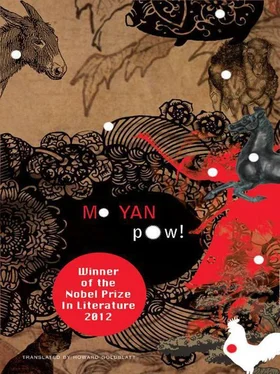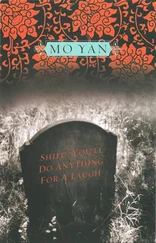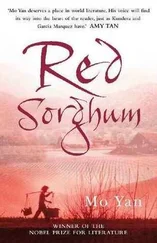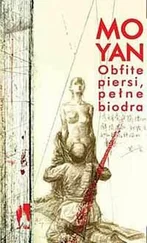The Wise Monk's eyes flash and his mouth twitches just before he laughs out loud. He stops abruptly, the lingering echo sounding like the tinny reverberation from a struck gong. I'm momentarily dazed, unable to determine if that bizarre laugh means I should continue speaking honestly or stop. Honesty is always best, I figure, and speaking honestly in front of the Wise Monk seems appropriate. The woman in green is still sprawled in the same place. Nothing has changed—well, hardly anything. She's playing a little game with her spittle, easing bubbles out between her lips until they burst in the sunlight. I try to imagine what those little bubbles taste like—‘Go on’—
They kissed each other's greasy lips, interrupted by frequent belches that saturated the air in the yurt, saturated the air of the little log cabin, saturated the air of the little Korean restaurant, with the smell of meat. Then they undressed each other. I knew what Father's body looked like—he'd often taken me down to the river in the summer to bathe—but I'd only once caught a fleeting glimpse of Aunty Wild Mule's body. But that one time was more than enough. She had a sleek body with an oily green cast that gleamed, almost fluorescent, in the light. My boyish fingers itched to reach out and touch her, and if I had, and if she didn't hit me because of it, I'd have really felt around. How would she have felt? Icy cold or fiery hot? I'd have liked to know, but I never did touch her. So I never knew. But my father did. His hands roamed over her body, her buttocks and her breasts. Father's dark hands and Aunty Wild Mule's pale buttocks and breasts. I imagined his hands as wild and savage, like those of a marauder, squeezing her buttocks and breasts dry. She'd moan, her eyes and her mouth expelling light; Father's too. Wrapped in each other's arms, they'd writhe and roll atop a bearskin coverlet, they'd tumble about on the heated kang , they'd ‘do it’ on the wooden floor. Four hands groping and roaming, four lips pressing and crushing, four legs slithering and entwining, every inch of skin rubbed nearly raw…creating heat and setting off sparks, until both bodies gave off a luminescent blue glint, like a pair of enormous, scaly, glittery, deadly serpents coiled in an embrace. Father would close his eyes, the only sound his heavy breathing, but screams would tear from the mouth of Aunty Wild Mule. Now I know why she screamed, but at the time I was innocent where relations between the sexes were concerned and didn't understand the drama playing out between Father and his woman. Her screams banged against my eardrums: ‘Oh, my dear…I'm dying…you're killing me…’ My head pounded as I waited to see what would happen next. I wasn't scared but I was terribly nervous, afraid that my father and Aunty Wild Mule, and I, the sneaky observer, were involved in something sinful and awful. I watched as Father lowered his head and laid his mouth over hers so he could swallow most of her screams, except for a few fragments that slipped out through the sides of his mouth— I sneak a look at the Wise Monk to see the effect, if any, of my slightly erotic description. I detect only a slight redness in his impassive face, but perhaps that's always been there. I think I'd be well advised to exercise restraint. Since I‘ve seen through the vanity of life and chosen an ascetic future, relating the episodes from the lives of my parents makes me feel as if I'm talking about the ancients —
I don't know if it was the smell of meat or Aunty Wild Mule's screams that drew, out of the darkness, hordes of small children—they crowded round the yurt or sprawled up against the doorway of the forest cabin, their little bottoms sticking up in the air as they peeped through the cracks in the logs. Then, in my mind, wolves—a whole pack, not just one—came, drawn by the smell of meat. The children ran off, their clumsy, stumpy bodies leaving marks on the snow as they stumbled away. But the wolves remained, squatting outside the yurt, the teeth grinding in their greedy mouths. I was afraid they'd rip open the yurt or tear down the log cabin, pounce on my father and his woman and have them for dinner. But no, they merely formed a circle round the yurt and then sat on their haunches, waiting, like loyal hunting dogs—
A broad road in front of the dilapidated temple wall connects us to the bustling world beyond. Beyond the weather-beaten bricks of the wall and the breaches caused by casual wall-climbers, beyond the woman in the breach in the wall—she is combing her lush hair, having laid the red flower on the wall beside her. She cocks her head, sending hair cascading over her bosom, and runs a red comb through it, over and over. Each of those jerky movements tugs at my heart. I pity all those strands of hair, I feel sad, I feel an ache in my nose and tears in my eyes. If she'd let me comb her hair, I'm thinking, I'd be gentle, infinitely patient, and not damage a single strand, even if there were tiny insects or spiders between them, even if birds had made their nests to raise fledglings. I think I detect a look of annoyance on her face, an expression common to women who have to deal with a full head of hair. Perhaps smugness is more appropriate. The subdued aroma at the roots of her hair carves its way into my nose and makes me light-headed, as if I am drunk on strong, aged spirits—I see traffic out on the highway. The metal arm of a brick-red truck-mounted crane swings past my field of vision, like a huge oil painting on the move. Twenty-four raised mortars, a ghostly white light glinting off their tubes, their shapes remarkably similar to tortoise-like tanks, pass through my field of vision, like a comic strip. A blue trailer-truck that could be used either for passengers or for freight careens past; a shrill loudspeaker is mounted on the roof, a ring of colourful banners circles the cab, each painted with a woman's fair face that flaps in and out of view, showing off curved brows and bright red lips. A dozen or more people are standing on the trailer bed, dressed in blue T-shirts and baseball caps. They are shouting a slogan in chorus: ‘People's Representative Wang Dehou, all work, no play and no show.’ But they grow quiet as they pass the temple, the garish trailer now like a glittery coffin on the move. They pass through my line of vision. Off beyond the wall, on one side of the highway, on a lawn directly opposite this crumbling Wutong Temple, an enormous bulldozer chugs along. My gaze passes over the wall; I can see the vehicle's orange canopy, and, every once in a while, its metal arm and hideous scoop.
Wise Monk, I'm telling you everything, holding back nothing. Back then I was a child whose only thought was to eat as much meat as possible. Anyone who gave me a fragrant leg of fatty lamb or a delicious bowl of fatty pork, I didn't care who it was but I'd call him Daddy or go down on my knees and kowtow. Or both. Even today, after all this time, if you visit my hometown and mention my name—it's Luo Xiaotong—you'll see their eyes flash, a strange light, as if you'd mentioned Lao Lan's third uncle Lan Daguan. Why? Because anything associated with me and with meat will scroll through their heads like a comic strip. And that's because of all the tales associated with the third young master of the Lan clan, who was sent overseas after sleeping with more women than you can count, a man of wide experience—those tales will also scroll through their heads like a comic strip. They wouldn't say it but deep down they'd sigh: ‘That loveable, pitiful, hateful, respectable, vile…but extraordinary meat boy…That mysterious, impenetrable Third Young Master…that evil son of a bitch…’
If I'd been born somewhere else I may not have developed such a strong craving for meat; but fated to be born in Slaughterhouse Village, where everywhere you looked there was meat on the hoof and meat on the slab, bloody hunks of meat and washed-clean chunks of meat, meat that'd been smoked and meat that hadn't, meat that'd been injected with water and meat that hadn't, meat that'd been soaked in formaldehyde and meat that hadn't, pork beef mutton dog donkey horse camel…The wild dogs in our village were so fat from eating spoilt meat that grease oozed from their pores, while I was as skinny as a rail because I couldn't have any. For five years I ate no meat, not because we couldn't afford it but because Mother refused to spend. Before Father ran off, there was always a thick layer of grease along the edge of our wok and bones piled up in the corners. Father loved meat, especially pig's head. Every few days he'd bring home a white-cheeked, fatty pig's head with red-tipped ears. He and Mother always argued over it, and eventually the fights turned physical. She was a middle peasant's daughter, brought up to be a hard-working, frugal housewife, to never live beyond her means and to use her money to build a house and own land. After the land-reform period, my obstinate maternal grandfather dug up the family's life savings and bought five acres of land from Sun Gui, a rehabilitated farm labourer. That waste of money unleashed decades of humiliation upon Mother's family. His attempt to swim against the tide of history made my idiot grandfather a village laughing-stock. My father, on the other hand, was born into a lumpenproletariat family. He spent his youth with my good-for-nothing grandfather and grew up into a lazy glutton. His philosophy of life was: eat well today and don't worry about tomorrow. Take it easy and enjoy life. The lessons of history coupled with my grandfather's teachings made him the kind of man who would never spend only ninety-nine cents if he had a dollar in his pocket. Unspent money always cost him a night's sleep. He often counselled my mother that life was an illusion, everything but the food you put in your belly. ‘If you spend your money on clothes,’ he'd say, ‘people can rip them off your back. If you use it to build a house, decades later you're the target of a struggle.’ The Lan clan had plenty of houses but now they're a school. The Lan Clan Shrine was a splendid building that had been taken over by the production team to turn sweet potatoes into noodles. ‘Buy gold and silver with your money and you could lose your life. But spend your money on meat and you'll always have a full belly. You can't go wrong.’ ‘People who live to eat don't enter Heaven’ Mother would reply. ‘If there's food in your belly,’ Father'd say with a laugh, ‘even a pigsty is Heaven. If there's no meat in Heaven, I'm not going there even if the Jade Emperor comes down to escort me.’ I was too young to care about their words. I'd eat meat while they argued, then sit in the corner and purr, like that tailless cat that lived such a luxurious life out in the yard. After Father left, in order to build our five-room house, Mother turned into a skinflint; food seldom touched her lips. Once the house was built, I'd hoped she'd change her views on eating and let meat return to our table after its long absence. Imagine my shock when her scrimping grew worse. A grand plan was taking shape in her mind—to buy a truck, like the one that belonged to the Lan clan, the richest in the village. A Liberation truck, manufactured at Changchun No. 1 Automobile Plant, green, with six large tyres, a square cab and a bed as solid as a tank. I'd have preferred living in our old, three-room country shack with the thatched roof if that would have put meat back on the table. I'd have preferred travelling down bumpy rural roads on a walking tractor that nearly shook my bones apart if that would have put meat back on the table. To hell with her big house and its tiled roof, to hell with her Liberation truck and to hell with that frugal life which forbade even the smallest spot of grease! The more I grew to resent Mother, the more I longed for the happy days when Father was home. For a boy with a greedy mouth—like me—a happy life was defined by an unending supply of meat. If I had meat, what difference did it make if Mother and Father fought, verbally or physically, day in and day out? No fewer than two hundred rumours concerning Father and Aunty Wild Mule reached my ears over a five-year period. But what instilled a recurring longing in me were those three I mentioned, since meat figured in all of them. And every time the image of them eating meat blossomed in my head, as real as if they were right there with me, my nostrils would flare with its aroma, my stomach would growl, my mouth would fill with drool. And my eyes would fill with tears. The villagers often saw me sitting alone and weeping beneath the stately willow tree at the head of the village. ‘The poor boy! they'd sigh. I knew they'd misread the reason for my tears but was I incapable of setting them straight. Even if I'd told them it was the craving for meat that caused the tears, they wouldn't have believed me. The idea that a boy could yearn for the taste of meat until his tears flowed would never have occurred to them—
Читать дальше












